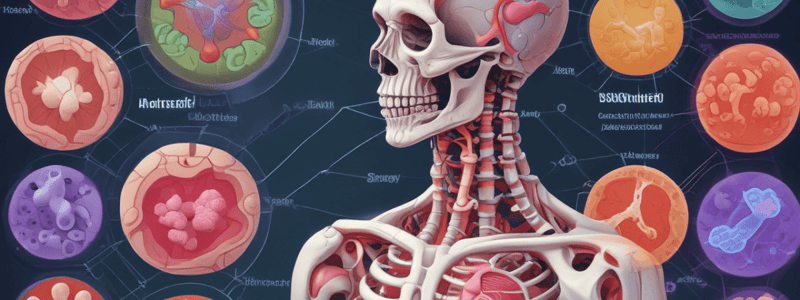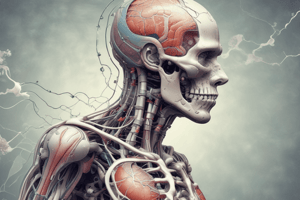Podcast
Questions and Answers
What is the primary function of calcitonin in regulating blood calcium levels?
What is the primary function of calcitonin in regulating blood calcium levels?
To inhibit osteoclast activity, stimulate the kidneys to increase calcium loss in the urine, and reduce blood calcium levels.
Under what conditions does calcitonin have the greatest effect on blood calcium levels?
Under what conditions does calcitonin have the greatest effect on blood calcium levels?
During periods of high bone turnover, such as in growing children.
What is the effect of high doses of calcitonin on blood calcium levels?
What is the effect of high doses of calcitonin on blood calcium levels?
Temporary decrease in blood calcium levels.
What is the relationship between calcitonin and the kidneys in regulating blood calcium levels?
What is the relationship between calcitonin and the kidneys in regulating blood calcium levels?
How do parathyroid hormone, calcitriol, and calcitonin work together to regulate blood calcium levels?
How do parathyroid hormone, calcitriol, and calcitonin work together to regulate blood calcium levels?
What is the source of calcitonin in the body?
What is the source of calcitonin in the body?
What is the normal range of calcium concentration in the blood, and what are some of the essential physiologic processes that calcium is required for?
What is the normal range of calcium concentration in the blood, and what are some of the essential physiologic processes that calcium is required for?
What triggers the release of calcitonin from the thyroid gland?
What triggers the release of calcitonin from the thyroid gland?
What are the two primary hormones that regulate blood calcium levels?
What are the two primary hormones that regulate blood calcium levels?
How does calcitonin's action on bone cells contribute to the regulation of blood calcium levels?
How does calcitonin's action on bone cells contribute to the regulation of blood calcium levels?
What is the precursor molecule in keratinocytes of the skin that is converted to vitamin D3 by ultraviolet light?
What is the precursor molecule in keratinocytes of the skin that is converted to vitamin D3 by ultraviolet light?
What is the role of parathyroid hormone in the production of calcitriol?
What is the role of parathyroid hormone in the production of calcitriol?
How do PTH and calcitriol interact in the bone?
How do PTH and calcitriol interact in the bone?
What happens to vitamin D3 as it circulates in the blood and passes through the liver?
What happens to vitamin D3 as it circulates in the blood and passes through the liver?
What is the active form of vitamin D3, and how is it formed?
What is the active form of vitamin D3, and how is it formed?
What is the effect of PTH and calcitriol on calcium excretion in the kidneys?
What is the effect of PTH and calcitriol on calcium excretion in the kidneys?
What is the unique function of calcitriol in the small intestine?
What is the unique function of calcitriol in the small intestine?
How does the presence of parathyroid hormone affect the final enzymatic step in the kidney?
How does the presence of parathyroid hormone affect the final enzymatic step in the kidney?
Why is it essential to regulate blood calcium levels?
Why is it essential to regulate blood calcium levels?
What is the initial stimulus for the parathyroid glands to release parathyroid hormone?
What is the initial stimulus for the parathyroid glands to release parathyroid hormone?
What is the significance of the skeleton in relation to calcium regulation?
What is the significance of the skeleton in relation to calcium regulation?
What is the characteristic of rickets caused by vitamin D deficiency?
What is the characteristic of rickets caused by vitamin D deficiency?
What is the net effect of calcitriol on bone?
What is the net effect of calcitriol on bone?
How do PTH and calcitriol interact with the kidneys to regulate blood calcium levels?
How do PTH and calcitriol interact with the kidneys to regulate blood calcium levels?
What is the result of the removal of calcium from bone, decrease in loss of calcium from the kidney, and increase in calcium absorption from the small intestine?
What is the result of the removal of calcium from bone, decrease in loss of calcium from the kidney, and increase in calcium absorption from the small intestine?
What inhibits the release of additional PTH?
What inhibits the release of additional PTH?
Flashcards are hidden until you start studying
Study Notes
Regulating Blood Calcium Levels
- Blood calcium levels must be regulated between 8.9 and 10.1 mg/dL for physiologic processes like muscle contraction, exocytosis, heart stimulation, and blood clotting.
- The two primary hormones regulating blood calcium are calcitriol (active form of vitamin D) and parathyroid hormone.
Activation of Vitamin D to Calcitriol
- Vitamin D is converted to calcitriol through a three-step process:
- Ultraviolet light converts 7-dehydrocholesterol in skin to vitamin D3, which is released into the blood.
- Vitamin D3 is converted to calcidiol by liver enzymes through the addition of a hydroxyl group.
- Calcidiol is converted to calcitriol by kidney enzymes through the addition of another hydroxyl group, which is increased in the presence of parathyroid hormone.
Parathyroid Hormone and Calcitriol
- Parathyroid hormone (PTH) is secreted by parathyroid glands in response to low blood calcium levels.
- PTH and calcitriol interact with organs to regulate blood calcium levels:
- Bone: Synergistically increase calcium release from bone into blood by increasing osteoclast activity.
- Kidneys: Synergistically stimulate calcium reabsorption in tubules, reducing calcium excretion in urine.
- Small intestine: Calcitriol increases calcium absorption from small intestine into blood.
Calcitonin
- Calcitonin is released by the thyroid gland's parafollicular cells in response to high blood calcium levels and stress from exercise.
- Calcitonin:
- Inhibits osteoclast activity, reducing bone resorption.
- Stimulates kidneys to increase calcium excretion in urine, reducing blood calcium levels.
- Limitations of calcitonin:
- Has greatest effect in conditions of high bone turnover, such as in growing children.
- High doses of calcitonin only temporarily decrease blood calcium levels, making it ineffective for long-term calcium regulation.
Studying That Suits You
Use AI to generate personalized quizzes and flashcards to suit your learning preferences.




